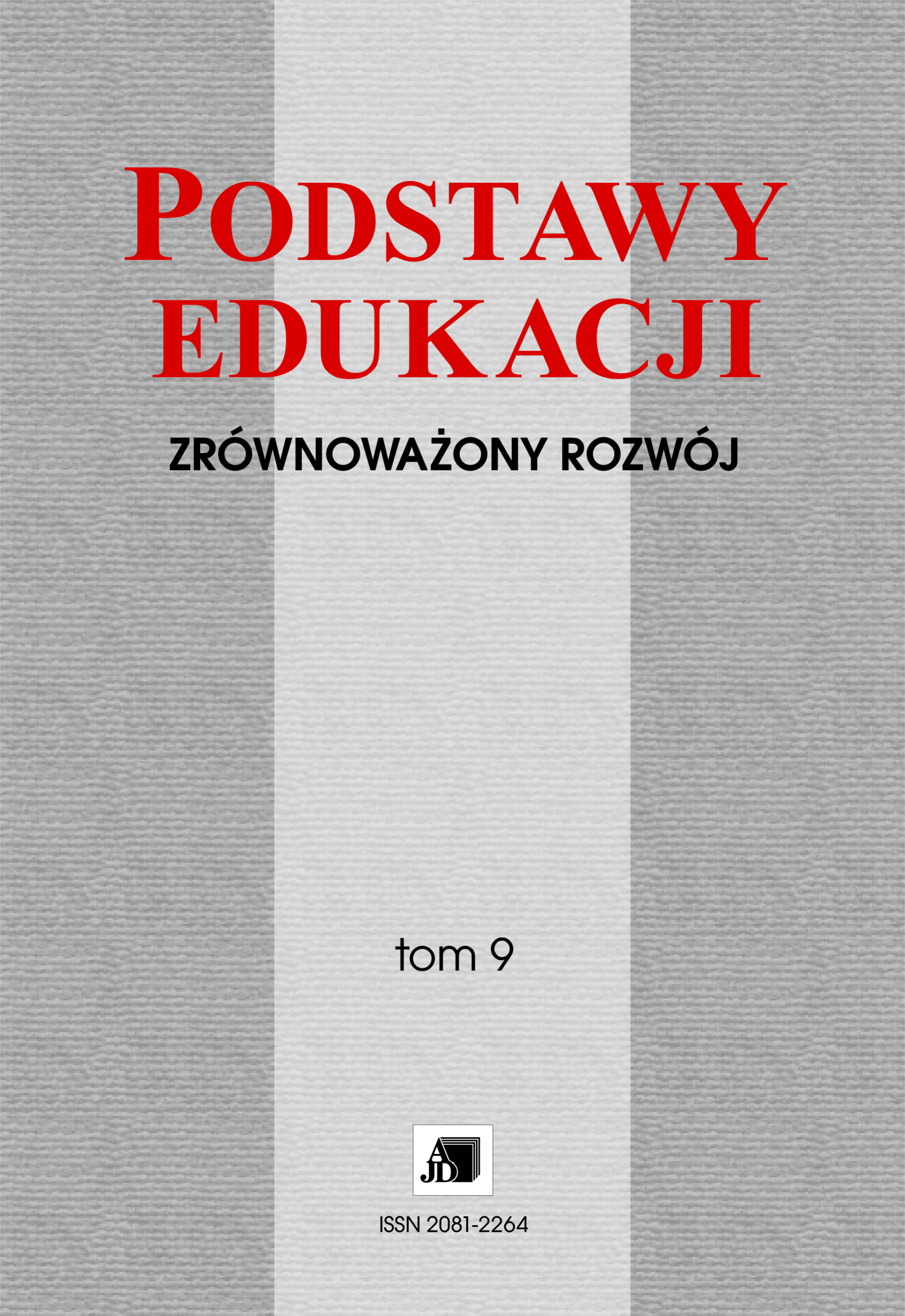Abstract
The article deals with the model of learning in late adulthood. The model is based on a wide range of literature on the learning process among the elderly, shaping their wisdom in late adulthood and successful ageing. Moreover, the model is largely based on both Peter Jarvis’s theory and the concept of wisdom presented by Monika Ardelt.
References
Ardelt, M. (1997). Wisdom and life satisfaction in old age. The Journals of Gerontology Series B: Psychological Sciences and Social Sciences, 52(1), 15–27.
Ardelt, M. (2000). Intellectual versus wisdom-related knowledge: The case for a different kind of learning in the later years of life. Educational Gerontology, 26(8), 771–789.
Ardelt, M. (2003). Empirical assessment of a three-dimensional wisdom scale. Research on aging, 25(3), 275–324.
Baltes, P., Glück, J., Kunzmann, U. (2004). Mądrość. Jej struktura i funkcja w kierowaniu pomyślnym rozwojem w okresie całego życia. W: J. Czapiński (red.), Psychologia pozytywna. Nauka o szczęściu, zdrowiu, sile i cnotach człowieka. Warszawa: PWN.
Baltes, P.B., Staudinger, U.M. (2000). Wisdom: A metaheuristic (pragmatic) to orchestrate mind and virtue toward excellence. American psychologist, 55(1), 122.
Bron, A. (2006). Rozumienie uczenia się w teoriach andragogicznych. Teraźniejszość – Człowiek – Edukacja, 4(36), 7–24.
Brookfield, S. (2003). Adult cognition as a dimension of lifelong learning. W: J. Field, M. Leicester (red.), Lifelong learning: Education across the lifespan, New York: Routledge, 89–101.
Brugman, G.M. (2006). Wisdom and aging. Handbook of the psychology of aging, 6, 445–476.
Clayton, V.P., Birren, J.E. (1980). The development of wisdom across the life span: A reexamination of an ancient topic. Life-span development and behavior, 3, 103–135.
Etezadi, S., Pushkar, D. (2013). Why are wise people happier? An explanatory model of wisdom and emotional well-being in older adults. Journal of happiness studies, 14(3), 929–950. http://dx.doi.org/10.1007/s10902-012-9362-2.
Fabiś, A. (2015). Rozwój duchowy jako atrybut dojrzałości w starości. Biblioteka Gerontologii Społecznej, 1(9), 11–18.
Falewicz A. (2015). Geneza i przegląd psychologicznych koncepcji mądrości. Studia Koszalińsko-Kołobrzeskie, (22), 243–254.
Greene, J.A., Brown, S.C. (2009). The wisdom development scale: Further validity investigations. The International Journal of Aging and Human Development, 68(4), 289–320. http://dx.doi.org/10.2190/AG.68.4.b.
Jankowski, D. (2006). Środowisko edukacyjne człowieka dorosłego jako problem pedagogiki społecznej i andragogiki. Rocznik Andragogiczny, 47–65.
Jankowski, D. (2012). Edukacja i autoedukacja: współzależność, konteksty, twórczy rozwój. Toruń: Wydawnictwo Adam Marszałek.
Jarvis, P. (2009). Learning to be a Person in Society, London.
Jarvis, P. (2011). Teaching, learning, and the human quest: Wisdom. New directions for adult and continuing education, 2011(131), 85–93. http://dx.doi.org/ 10.1002/ace.424.
Jarvis P. (2012a). Learning from everyday life. Human & Social Studies. Resarch and Practice, 1, 1–20.
Jarvis, P. (2012b). Transformatywny potencjał uczenia się w sytuacjach kryzysowych. Teraźniejszość – Człowiek – Edukacja, 3.
Jarvis, P. (2012c). Wisdom and the Quest for Meaning. Intergenerational Solidarity and Older Adults’ Education in Community, 20.
Kozerska, A. (2015a). Edukacja seniorów w kontekście paradygmatu pomyślnego starzenia się – kontrowersje i wątpliwości. Edukacja Dorosłych, 2, 23–36.
Kozerska, A. (2015b). Kształtowanie własnego środowiska edukacyjnego w okresie późnej dorosłości. Podstawy Edukacji. Między porządkiem a chaosem, 8, 217–237. http://dx.doi.org/10.16926/pe.2015.08.16.
Kozerska, A. (2016). Educational aspects of Polish seniors’ participation in religious organisations as well as organisations promoting knowledge. Studies in the Education of Adults, 48(1), 4–22. http://dx.doi.org/10.1080/ 02660830.2016.1149354.
Kramer, D.A. (2000). Wisdom as a classical source of human strength: Conceptualization and empirical inquiry. Journal of social and clinical psychology, 19(1), 83.
Kunzmann, U. (2004). Approaches to a good life: The emotional-motivational side to wisdom. Positive psychology in practice, 31, 504–517.
Malewski, M. (2013). „Dorosłość” – kłopotliwa kategoria andragogiki. Teraźniejszość – Człowiek – Edukacja, 3, 23–40.
Martinson, M., Berridge, C. (2015). Successful aging and its discontents: A systematic review of the social gerontology literature. The Gerontologist, 55(1), 58–69. http://dx.doi.org/10.1093/geront/gnu037.
Oleś, P. (2011). Psychologia człowieka dorosłego: ciągłość – zmiana – integracja. Warszawa: PWN.
Rowe, J.W., Kahn, R.L. (1998). Successful aging. New York: Pantheon Books.
Semków, J. (2007). Andragogiczne uniwersalia – mit czy rzeczywistość? W: E. Dubas (red.), Uniwersalne problemy andragogiki i gerontologii. Łódź: Wydawnictwo UŁ, 35–40.
Sroczyński, W. (2007). „Środowisko niewidzialne” w andragogice. Środowisko z punktu widzenia andragogiki humanistycznej. W: B. Juraś-Krawczyk (red.), Wybrane obszary badawcze andragogiki. Łódź: Wydawnictwo WSHE, 23–45.
Tornstam, L. (2005). Gerotranscendence. A developted theory of positive aging, New York.
Tornstam, L. (2011). Maturing into gerotranscendence. The journal of Transpersonal Psychology, 43(2), 166–180.
Wink, P., Helson, R. (1997). Practical and transcendent wisdom: Their nature and some longitudinal findings. Journal of Adult Development, 4(1), 1–15.
Wink, P., Dillon, M. (2002). Spiritual development across the adult life course: Findings from a longitudinal study. Journal of Adult Development, 9(1), 79–94. http://dx.doi.org/10.1023/A:1013833419122.
Znaniecki, F. (1988). Wstęp do socjologii, Warszawa: PWN.
